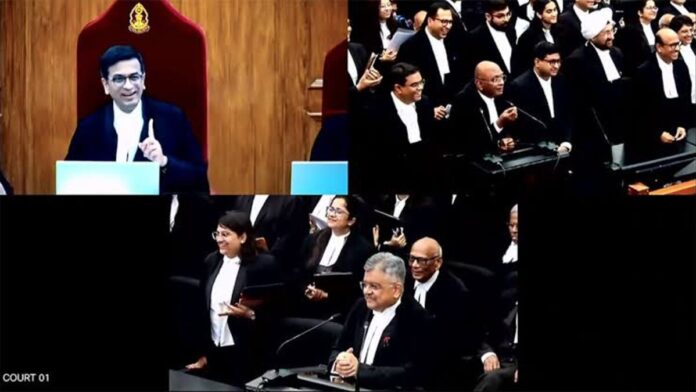On Monday, a seven-judge Supreme Court bench ruled that lawmakers who accept payments to vote or speak in Parliament or State Legislative Assemblies will not be shielded from criminal prosecution by parliamentary privilege or immunity.
“Privileges and immunities are not gateways to claim exemptions from the general law of the land… Corruption and bribery of members of the legislature erode the foundation of Indian parliamentary democracy,” the Supreme Court observed.
A 25-year-old majority opinion of the Supreme Court, established in the infamous JMM bribery case judgement of 1998, that lawmakers who accepted bribes were immune from prosecution for corruption if they proceeded to vote or speak in the House as agreed upon was overruled by the unanimous verdict written by Chief Justice of India D.Y. Chandrachud.
The majority of the five-judge bench in the JMM bribery case made a mistake, according to the seven-judge bench. The court wished to avoid repeating the serious mistake. There was a stake in representative democracy. Chief Justice Chandrachud clarified that the offence of bribery was complete the moment the corruption money was accepted. Culpability of the legislator did not depend on whether he actually delivered for the bribe-giver on the floor of the House.
“The legislator will face criminal prosecution whether or not he makes a speech or votes in favour of the bribe-giver. The offence of bribery is complete on the acceptance of the money or on the agreement to accept money being concluded,” Chief Justice Chandrachud observed.
The Constitution Bench rejected arguments that reducing parliamentary immunity would render opposition MPs’ votes or speeches in the House subject to criminal investigations and increase the likelihood that political parties in power would abuse the legal system.
Bribed lawmakers, the court said, were destructive to the “aspirational and deliberative ideals of the Constitution and create a polity which deprives citizens of a responsible, responsive and representative democracy”.
Chief Justice Chandrachud reasoned that giving or accepting bribes was not covered by the freedom of speech and expression, which includes the right to vote in the House, and the related immunity afforded to politicians under Article 105 and 194.
“Articles 105 and 194 of the Constitution seek to sustain an environment in which debate and deliberation can take place within the legislature. This purpose is destroyed when a member is induced to vote or speak in a certain manner because of an act of bribery,” Chief Justice Chandrachud noted.
Parliamentary immunity would only become effective, according to the ruling, if a lawmaker takes action to support “fertilising a deliberate, critical and responsive democracy.”
There are two situations in which one could assert parliamentary privilege or the shield of immunity. A lawmaker may act in two ways: first, to uphold the dignity and authority of the House and its members as a whole; and second, to exercise his rights to free expression, protest, and the avoidance of detention, among other things. The court stated that if a claim for immunity failed this two-fold test, it would not stand.
“An interpretation which enables an MP to claim immunity from prosecution for an offence of bribery would place them above the law. This would be repugnant to the healthy functioning of parliamentary democracy and subversive of the rule of law,” Chief Justice Chandrachud observed.
Criminal courts and Houses of legislature have parallel jurisdiction over allegations of bribery. One cannot negate the jurisdiction of the other. “The jurisdiction exercised by a competent court to prosecute a criminal offence and the authority of the House to take action for a breach of discipline in relation to the acceptance of a bribe by a member of the legislature exist in distinct spheres,” Chief Justice Chandrachud laid down.
The reference arose from an appeal filed by JMM leader Sita Soren, who was charged in the 2012 Rajya Sabha elections with accepting a bribe to vote for a specific candidate. The CBI had filed a chargesheet in the matter, notwithstanding her later denial of guilt on the grounds that she had voted for her party’s official nominee. She petitioned the supreme court after the Jharkhand High Court declined to suppress the chargesheet.
Shibu Soren, the former Union Minister and leader of JMM who was embroiled in the JMM bribery affair, is the father of Sita Soren. During a no-confidence vote in 1993, it was suspected that eight MPs and four JMM MLAs had been bought off to keep the then-P.V. Narasimha Rao government in power. After casting their votes in accordance with the scandal, they claimed immunity from criminal prosecution on the grounds that their vote had taken place inside Parliament.
The highest court ruled in the JMM bribery case in 1998 that lawmakers who accepted bribes may avoid prosecution as long as they continued to carry out their “legislative function”—voting or making speeches, for example.
Chief Justice Chandrachud had noted that the majority opinion had flipped the anti-corruption law on its head when she reserved the review case in October of last year.




